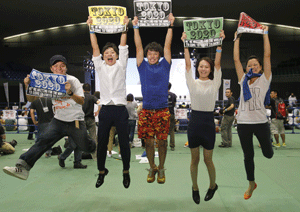 The International Olympic Committee (IOC) decision to award Tokyo, Japan the right to host the 2020 Summer Olympic Games has benefits for Japan beyond economic and sporting opportunities.
The International Olympic Committee (IOC) decision to award Tokyo, Japan the right to host the 2020 Summer Olympic Games has benefits for Japan beyond economic and sporting opportunities.
Fuelled by the city’s dynamic atmosphere and youth-driven culture, the successful bid to host the 2020 Summer Olympic Games in Tokyo, Japan will have an important role to play in the healing process of Japan following the national earthquake tragedy in 2011.
As I explained in my latest report, ‘Global Opportunities for sports marketing, infrastructure and consultancy services 2022′, published by IMR, over the next few years, Japan will host the 2014 ISU World Figure Skating Championships, the 2014 World Table Tennis Championships, the 2017 Asian Winter Games and the 2019 IRB Rugby World Cup.
The decision by the IOC will help to consolidate and strengthen Japan’s position on the global sports stage and opens the door for exciting new business development opportunities for sports marketing and consultancy services firms in that Region.
Japan made history by being the first Asian country to be awarded hosting rights for an IRB Rugby World Cup. Hosting the tournament in 2019 is expected to increase the popularity of the sport in the country. The event is estimated to cost £145.1m to stage.
With rugby being a developing sport in Japan and Asia as a whole and now this highly prestigious award to host the 2020 Olympic Games, this presents an excellent opportunity for the UK sports marketing and consultancy sector which has strong credentials in both rugby and the Olympic Games.
Quick Fact File
- Within the official bid document to host the Summer Olympic Games 2020, Tokyo has committed to building a new 80,000-seat Olympic Stadium, Kasumigaoka National Stadium, on the site of the 1964 Olympic Stadium and for it to be one of the most advanced sports and entertainment stadiums in the world, capable of being used for the opening and closing Ceremonies as well as competitions including athletics.
- An enhanced plan for the Olympic Village, relocated to a magnificent waterfront setting at the very centre of the venue plan, at the intersection of the Heritage Zone and Tokyo Bay Zone. Almost all venues are within an 8km radius of Village. Following the Olympic and Paralympic Games 2020, the village site will become the Tokyo International Exchange Plaza, a residential and mixed-use development that will become a major cultural and education centre housing facilities for international students and global institutions.
- The modernisation and development of a number of iconic legacy facilities from the acclaimed Tokyo 1964 Olympic Games, combined with the construction of new world-class sports facilities. The cluster of new permanent venues will be located in the developing Sea Forest Park overlooking Tokyo Bay.
- Critically acclaimed London-based architect Dame Zaha Hadid, who also designed the iconic Aquatics Centre used at the London 2012 Olympic Games, has won the international contest with a futuristic vision for the national stadium that will take centre stage at the 2019 Rugby World Cup Final. The new stadium will eventually replace the current venue in Tokyo that is also known as the Kasumigaoka National Stadium that was originally built as the main venue for the 1958 Asian Games and was also used for the 1964 Olympic Games.
- It is estimated that the national stadium will be re-built at a cost of £1.04bn, with officials also hoping that it will form the centre piece of a successful bid to host the Summer Olympic Games 2020. The new national stadium will also be a source of immense pride for the Japanese people. “Japan’s newly refurbished stadium will be the best of the best,” claims Tsunekazu Takeda, the president of Tokyo 2020 and Japanese Olympic Committee.
- Live sites, fan trails and other entertainment points integrated into the Olympic Plan and the City to enhance the community and visitors’ unique experience of the Olympic Games 2020.
- An Olympic Games plan in close alignment with new and extended urban planning and development strategies for Tokyo, with venues and facilities connected by one of the world’s most efficient public transport systems undergoing constant and integrated improvement.














Recent Comments